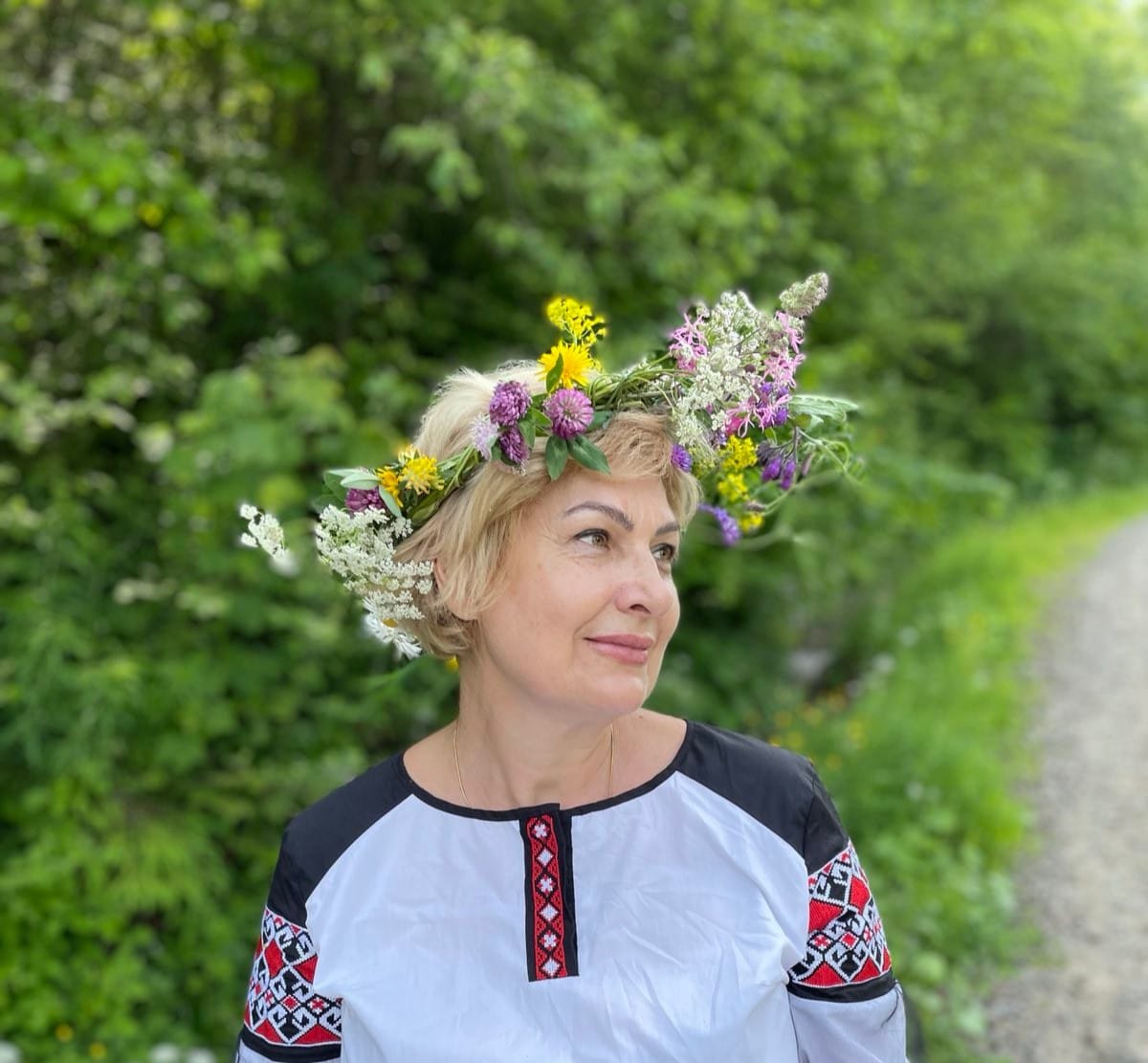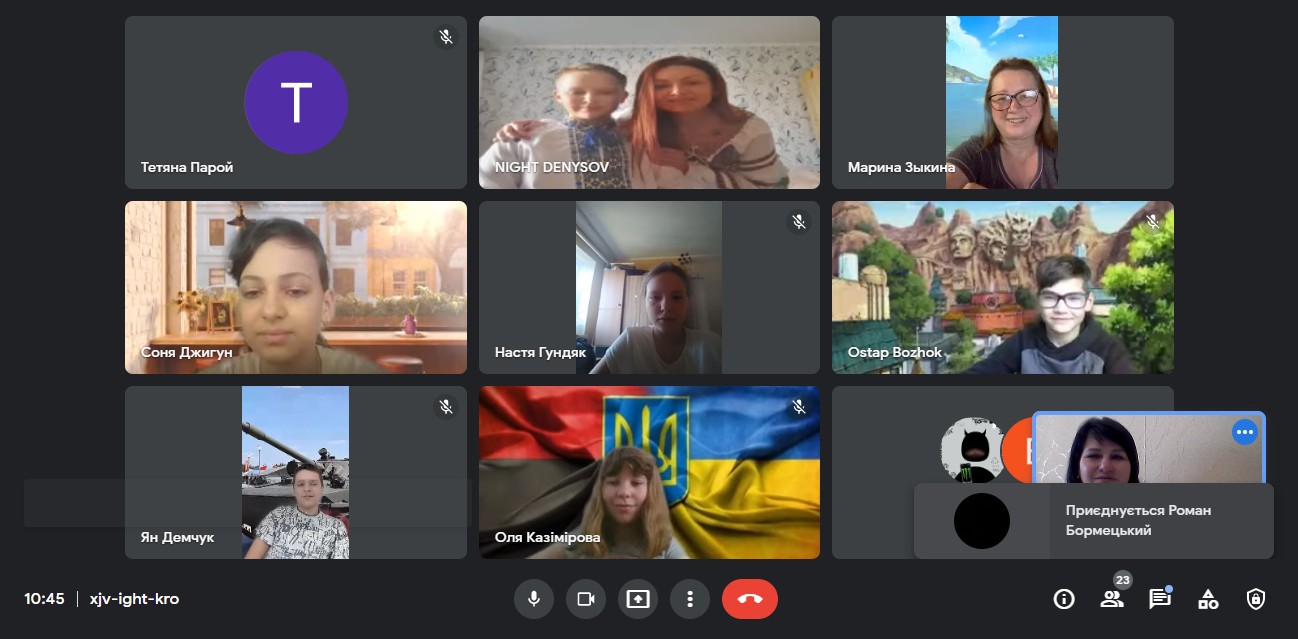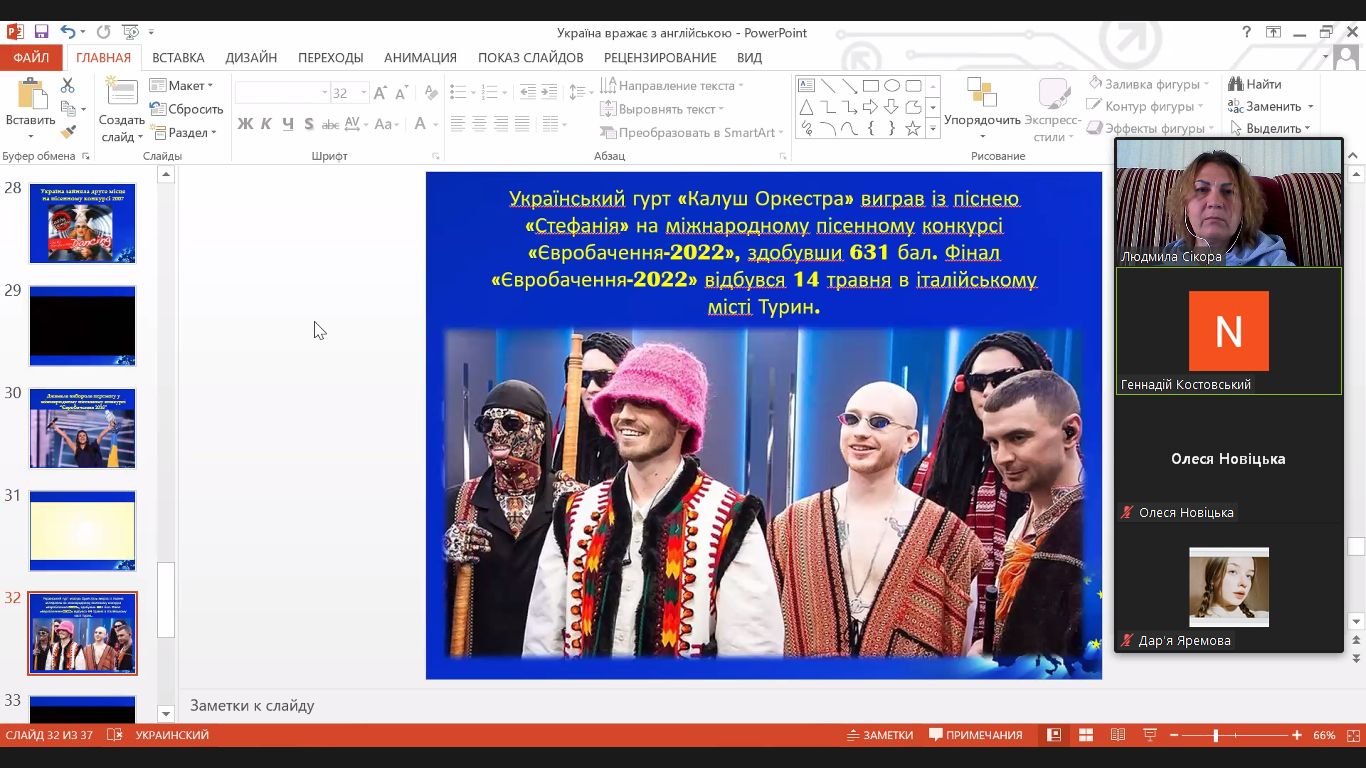Interview 16. Life goes on. Iryna Tomych
The war taught Ukrainian educators not to give up but to organize themselves and work for the future, particularly in implementing NUS in primary schools. Iryna Tomych, director, teacher of foreign literature and Defense of Ukraine in Educational Complex No. 9 of Khmelnytskyi, tells us about this. The team led by Ms. Iryna actively works on changes in education and moves from dry teaching to lively dialogue with students on topics of interest to them. Ms. Iryna believes that supporting children, patriotic education, and shaping future citizens is more timely than ever.
The Main Lesson
You need to be ready for war every day, every minute. Preparation for events cannot be postponed until tomorrow. In peaceful life, we never paid attention to the importance of studying the subject “Defense of Ukraine” and preparing survival kits or rules of behavior in emergencies. But this preparation should be practically every day in order to save our lives and the lives of the people around us. It is essential.
From the Fog to the Sun
I can compare the first month of the war to a fog: you go out in a familiar place, walk as if in a fog, and don’t get where you want to go. In this fog, you lose familiar landmarks. The same fog was in my head; it was tough to control myself. I must confess that I was unprepared for such events psychologically, materially, or morally.
But at school, we actively began to prepare for the war, the team stood behind me, and we had to organize studies after the holidays. My family was looking at me – children with families and a granddaughter who came to me from Kyiv at the beginning of the war. A lot has changed in our lives, even in everyday life, because we had to organize a bomb shelter at home and prepare supplies. For this, we needed an impetus, which, unfortunately, the war gave us – to be collected and prepared. I understood that this fog must be dispelled. Otherwise, it will swallow me.
As I interact with people and see our winning spirit, the fog has turned to sunshine. Now I am absolutely sure of our victory.
Living Legends
Apparently, the war put all the dots on the “i,” and taught us to be brave and frank. I didn’t support our president, but now he makes me very proud; I am not ashamed of him. Of course, I am proud of our Armed Forces, their courage and bravery. I was apprehensive about the “Azov” regiment, followed the news from Mariupol, from “Azovstal.” When I saw the information from the catacombs, I couldn’t hold back tears. For me, “Azovians” are a living legend that I will tell my grandchildren about. I will definitely go to Mariupol and lay flowers for all those who fought and died there.


I chastise myself for not working enough, and I will definitely do something if there is an opportunity. I still have strength and potential, and I think I will manage.

Educating the Nation
I want to do much more, be on the battlefield, in a hospital, or clearing rubble. I used to be a reserve nurse, and now I’m not in the military anymore, but I really want to be helpful. We, the principals of the schools, were gathered by the deputy mayor and said that perhaps we would like to join the army or the territorial defense, but if education does not work today, there will be chaos. This is our front and responsibility. Today, our educational front is very useful because even Bismarck said that the priest and the teacher educate the nation.
I believe that children should be brought up as uncompromising fighters against the occupier so that they understand what kind of neighbor we have and are ready to oppose them. After all, no one is sure that in three or five years, ambitious ideas to create an empire will not arise again. We must defend Ukrainian borders on our educational front.
Episodes of Victory
I was impressed by the act of one family. These are military personnel whose children studied and are studying at our school. Dad went to the east of Ukraine, and mom and two children came to school the next day and said they would volunteer with us. Every day from morning to evening, they were at school for almost two weeks and did everything necessary – they washed the floor, delivered lunches, and peeled potatoes. They were waiting for dad so much and worried about him so much that they couldn’t stay at home. I am proud of how much courage and strength this mother has and the fact that her children, who are so well-educated, study at our school.
My husband and two sons, without telling me anything, three of them registered at the Military Commissariat. My husband said: “What will I tell my granddaughter? That we had a war, and I didn’t help at all?” I was very impressed by their action. A friend joined the Armed Forces, although he is no longer suitable for the age, has health problems, and went through Afghanistan. He is a hero to me. My life consists of such episodes that will be part of our victory. The war has been going on since 2014, and we may not have fully understood it here in the west before. I think it is our great fault that we missed the moment when it was necessary to respond correctly to the war and not make mistakes. I chastise myself for not working enough, and I will definitely do something if there is an opportunity. I still have strength and potential, and I think I will manage.


Life goes on; it needs organization. There is no point in just sitting and waiting.

The Necessities of Life
Our community turned out to be very friendly and organized, gathered in a single fist. Currently, all trains to western Ukraine pass through Khmelnytskyi. On average, we receive 800 people daily staying in educational institutions. In the city, many points for issuing clothes and accepting documents were opened, and everything is organized very competently so that people receive quick help and support, both moral and psychological, and material. Shops and businesses operate in Khmelnytskyi to fill the budget and provide jobs. We had one vacancy at the school and hired an IDP person for it.
We help children and organize free workshops outdoors in the central square when the weather is good. In schools, we provide additional educational services for students because we understand that they have not studied for a month and a half and need to catch up with the program. I am very grateful that our team is more than neighbors and colleagues; it is a family. We support each other and organize communal work. Life goes on; it needs organization. If we are organized and continue to work according to the plan, there will be light at the end of the tunnel. There is no point in just sitting and waiting.
Educational Front
The city authorities of Khmelnytskyi check the readiness of schools for the new school year. Not all of them have shelters to conduct face-to-face studies safely. Therefore, the city council plans to equip them and allocate funds for this from the local budget. A distance learning process is planned in those schools where there are no shelters.
In order to help Ukrainian educators to continue teaching children during the war, the EdCamp Ukraine community launched a crowdfunding campaign — collecting funds for computer equipment and Internet access for those teachers who lost teaching equipment due to the war. The collected funds are also planned to be used for psychological support for teachers and to organize conferences where they can share their teaching experiences during the war. Both citizens from abroad – on the GoFundMe platform, and Ukrainians – on the EdCamp Ukraine page, can join the campaign by adding the comment “My war. Lessons” to the payment.
Keep in Line
Khmelnytskyi is a zone remote from active hostilities; we are safe compared to the frontline areas, where destruction is terrible, and there are many casualties. We have resumed training online, in a distance format, as in most educational institutions. The pandemic has taught us to work online and to set up the process so that the distance lesson practically does not differ from that in the classroom; we use digital tools effectively. Because of the air alarms, we developed an algorithm so that both the teachers and the children were safe. With teachers, we also work in small groups for safety reasons.
Despite the war, we have a lot of work to do because NUS must be implemented in primary school. We conduct consultations and methodical and pedagogical councils and draw up curricula. We follow all the guidelines to stay in line and not go astray. It is vital that no one gets disappointed and does not get discouraged – this is especially necessary for teachers because they have a delicate mental organization. Our psychologist conducted a series of seminars for teachers – just about the emotional state during the war. Many wanted to leave but could not; some have a sense of guilt because they did not take their children away from the war. The teachers are already in a working mood; we are discussing plans for the future. Life goes on, and despite russist aggression, we go our own way.
What Is More Important Than Formulas It is not always possible to put out all the material during this challenging time. And we decided that mutual support, and live communication with children on topics that concern them, are more critical than formulas or rules. We put minutes and even hours of communication into the work; teachers talk with children and get to know new students. Our school has 36 children forced to move from other cities because of the war, many from Kharkiv, Kyiv region, Chernihiv region, and Sumy. They emotionally share their impressions of leaving home. Such moments are more significant and influential than dry teaching of one or another subject. If the children need to say something or ask questions, we give them such an opportunity. Almost 80% of our students stay in the city — they study, volunteer, prepare for exams, and get used to living in such conditions. The main thing is to preserve our students’ psychological comfort and balance.


Now I greet the students with “Glory to Ukraine!”. When I hear in response – “Glory to the heroes!” I understand that we are on the same wavelength as my dear children.

Area of Responsibility
On March 9, we went to work. After the greeting, the children were completely silent; they looked at me as if they were waiting for me to say something very, very important. Of course, I started with current events. Now I greet the students with “Glory to Ukraine!”. When I hear in response – “Glory to the heroes!” I understand that we are on the same wavelength as my dear children.
They have grown up. In my classes, I say that learning is their area of responsibility, and I see that the attitude towards learning has changed in most of them. They have become much more responsible. This both pleases and disappoints me. Because the children have become adults, I would like to continue their childhood.
They follow events and understand which sources can be used because we talk much about media literacy. This is very important today. In class, we can discuss the latest news, what Arestovych said, what they liked or didn’t like about Zelenskyi’s address. Our teacher on the defense of Ukraine was called to the ranks of the Armed Forces of Ukraine, and I took these lessons upon myself. The boys are doing tactical training and evaluating the actions of our military command. They say that they are very literate. A vital role is played by the fact that our school is located in a military town, and most of the students are children of military personnel; their parents are currently in the Armed Forces of Ukraine. Children are very attentive and very responsible; no child thinks that events do not interest them or concern them.
Shortly before the war, in the lesson on foreign literature in the 7th grade, we studied Pushkin and Simonov from his “Wait for Me,” according to the program. The children asked why we study the works of the russians if they are aggressors and occupiers. I did not immediately find the answer to this question. I believe that we should get rid of the russian load in school, even though it is a classic. There are many writers from other countries who are similar in style and direction.
Rebirth of the soul
I really regret that this year’s wave of regional EdCamps (un)conferences will not happen because of this damn war. There will be no live spiritual communication between colleagues, professional growth, emotional uplift, which always occurs during such events.
I think that this format will not disappear because it came from within the teaching circle and not from above, as is usually the case. This format is creative, flexible, and perfect, and teachers have freedom and the right to choose – what we are fighting for today. The online form also has the right to life, but during the war, we understand that nothing can replace live communication. Support and emotions during meetings are invaluable; they really enliven us, inspire us, and give us a lot of energy.
If I were to organize an EdCamp, I would choose a psychological format with stories of teachers who worked during the war, in the occupation, in evacuation, and in other difficult conditions. I would like to meet these people, listen to them, and let their stories pass through me in order to be more open and understand others more. We planned our EdCamp called “The Game of Four Hands,” where we wanted to unite the partners with whom we cooperate – this is the community, parenting, and students. Of course, I would invite our volunteer community, defenders, to thank them and to share their life experiences. It would be a spiritual EdCamp because, after the events of the war, our souls need revival.
Citizens and Patriots
Having a neighbor like ours, one must always prepare for war. Therefore, my message to my foreign colleagues is to prepare for this every day. Maybe not to an armed conflict, but certainly to an information war.
It is definitely necessary to pay great attention to national and patriotic education and raise its level. It is also necessary to focus on subjects that form the civic consciousness of the younger generation — this is precisely the priority in building a state created by people with an active civic position and patriots. We had gaps in this, which now need to be filled. Our authorities should adopt specific laws in this area. It is very important to raise patriotism in children to form future citizens.
Text — Halyna Kovalchuk.
The interview series My War. The Lessons was prepared with financial support from the Black Sea Trust for Regional Cooperation – a project of the German Marshall Fund of the United States.
The views and opinions expressed are those of the author and do not necessarily reflect the official policy or position of EdCamp Ukraine and the Foundation.










